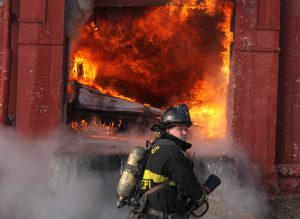 Court finds city has legal right to end previous plan, start new one
Court finds city has legal right to end previous plan, start new one
FINAL – Part 13
The fight is over
The fire fighters in the city of St. Louis will be retiring under two separate pension funds as a result of a ruling last month by the Missouri Supreme Court which ended a three-year struggle by Fire Fighters Local 73 and the original Firemen’s Retirement System (FRS) to prevent the city from starting a new, lower benefit, pension plan.
The Missouri Supreme Court refused to hear the appeal by the pension fund trustees of a lower court ruling that said the city of St. Louis could freeze the original pension plan and start a new one with lower retirement benefits, the new Firefighters Retirement Plan (FRP) that is now controlled by the city. State statutes and city ordinances controlled the old plan.
“While this outcome isn’t what we’d prefer, fire fighters are often faced with difficult situations,” said Local 73 President Demetris “Al” Alfred, “So, we will continue as we always have… manning our posts and providing the safety net the City of St. Louis has entrusted us to maintain.
“We are obviously disappointed,” he told the Labor Tribune, but added that the union would continue to be vigilant:
“As an organization, this local will continue to support our members who often risk much on behalf of our citizens. By working with our elected officials, who share in the responsibility to our citizens, we can both protect the city and ensure fairness toward our members.”
NEW PLAN
The new city plan has been in place for the past two years while the challenge worked its way through the legal system. It includes the following:
- Closed – The new plan ends the original retirement plan as of Feb. 1, 2013 but keeps intact the benefits some 600 fire fighters have already earned under the old plan.
- Life – The FRP maintains the maximum basic retirement of 75 percent of pay for life.
- Reduces benefits – The new plan reduces benefits from Feb. 1, 2013 forward for all fire fighters with less than20 years of service as of Feb. 1, 2013 and changes the retirement time for a full pension from 20 years of service at any age to 55 years of age.
- Costlier – All fire fighters will have to pay more into the system, nine percent from the original eight percent. However, since fire fighters had the full eight percent returned when they retired (because they are not eligible for Social Security), and new fire fighters will not receive that reimbursement, in effect new fire fighters are taking a nine percent pay cut. St. Louis fire fighters are already among the lowest paid fire fighters in the Midwest.
- Not fair – Fire fighters with at least 20 years of service as of Feb. 1, 2013 will be eligible to get their pension payments back from the old plan and the new plan in a lump sum upon retirement to help offset the lack of Social Security. However, veteran fire fighters who have been paying into the old pension plan but have less than 20 years of service as of Feb. 1, 2013 will get that reimbursement from the old pension plan but not the new one. There are no reimbursements for new fire fighters hired after Feb. 1, 2013.
TWIST OF FATE
In a strange twist of fate, Alfred said, the old pension plan is now better funded than the new pension plan.
Alfred, in a statement issued after the Supreme Court ruling, noting that the former pension plan’s costs had precipitated the call for this new plan, has “rebounded completely and is, by far, outperforming the new scheme. This also comes as no surprise. As a solid retirement system, the FRS has successfully weathered many market downturns.”
Mayor Francis Slay’s original intent with proposing a new smaller plan was to save the city money. The original plan, he said, consumed almost a third of the fire department’s budget.
Slay said in a statement that the change has already saved the city $10 million dollars over the past two years:
“(The) proposed changes … are both fair to fire fighters and to taxpayers. We have managed to get the skyrocketing cost of the fire fighters’ pension under control and also keep our credit rating strong. We did so by being fair to fire fighters for the extremely important job they do while protecting our citizens.”
OTHER PENSIONS UNDER ATTACK?
Several years ago in the heat of this struggle, Slay’s former Chief of Staff Jeff Rainford said that once the fire fighters’ plan was resolved, if it was in the city’s favor, they would then go after the pensions of police officers and civil service employees.
Inquiries to the mayor’s office on this issue went unanswered.
Jeff Roorda, business manager for the St. Louis Police Officers Association, told the Labor Tribune that while nothing has come from the mayor’s office, the pension plan trustees have “proposed” a second tier pension system for new hires. Nothing has been finalized on that issue.
However, Roorda added, the police pension is in good financial shape and their plan, as well as the Kansas City police pension plan, is controlled by the State.
Despite Missouri voters approving local control of the St. Louis police department in 2012, the pension plan is not a subject for collective bargaining at the local level. A separate state statute controls the two police plans.


